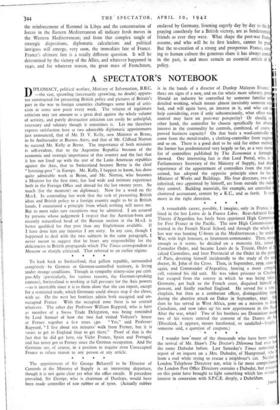A SPECTATOR'S NOTEBOOK
DIPLOMACY, political warfare, Ministry of Information, B.B.C. —the vast, sprawling (necessarily sprawling, no doubt) appara- tus constructed for presenting British policy and pictures of Britain's part in the war to foreign countries challenges some kind of criti- cism at some new point every week. The volume of legitimate criticism may not amount to a great deal against the whole volume of activity, and purely destructive criticism can easily be unhelpful, necessary and salutary though it sometimes is. Let me therefore express satisfaction here at two admirable diplomatic appointments just announced, that of Mr. D. V. Kelly, now Minister at Berne, to be Ambassador at Buenos Aires, and that of Mr. Clifford Norton to succeed Mr. Kelly at Berne. The importance of both missions is self-evident, that to the Argentine Republic because of the economic and strategic importance of that country and the fact that it has not lined up with the rest of the Latin American republics against the Axis, that to Switzerland because Berne is the chief " listening-post " in Europe. Mr. Kelly, I happen to know, has done quite admirable work at Berne, and Mr. Norton, who becomes a Minister for the first time, has had wide and intimate experience both in the Foreign Office and abroad for the last twenty years. So much (for the moment) on diplomacy. Now for a word on the M.o.I. In contending last week that the task of presenting British ideas and British policy to a foreign country ought to be in British hands, I enunciated a principle from which nothing will move me. But to most rules rare exceptions may be admitted. I am assured by persons whose judgement I respect that the Austrian-born and recently naturalised head of the Russian section at the M.o.I. is better qualified for that post than any Englishman available. If I have done him any injustice I am sorry. In any case, though I happened to deal with the two subjects in the same paragraph, I never meant to suggest that he bears any responsibility for the deficiencies in British propaganda which The Times correspondent at Moscow so sharply criticised. That referred to an earlier regime.
* *


























 Previous page
Previous page